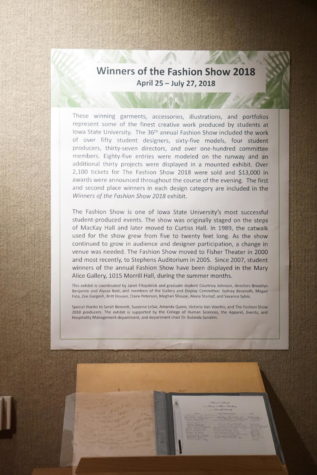Pros, cons of the flu shot
The Thielen Student Health Center offers two kinds of flu vaccines: an actual flu shot or a nasal spray, called FluMist.
October 6, 2015
Falling leaves and dropping temperatures signal the beginning of autumn, but they unfortunately also indicate the start of the dreaded flu season.
The flu, a viral respiratory illness, is highly contagious and can cause mild to severe symptoms. It can even lead to hospitalization and death in some cases.
Taking precautionary action is necessary to reduce the risk of contracting this illness.
The Centers for Disease Control and Prevention recommends that all individuals 6 months and older receive the flu vaccine every year. The vaccine, which is available through a flu shot or nasal spray, is the best preventative measure in reducing the risk and severity of the flu.
Ashley Loeffelholz, a pharmacist at NuCara Pharmacy in Ames, said it is important for students to consider getting a flu shot, especially since they are in close contact with one another.
Leslie Noty, student pharmacist at the Thielen Student Health Center and fourth-year pharmacy student at the University of Iowa, gave a similar recommendation. Noty said the close proximity students have with one another creates an environment in which illness can spread rapidly.
“The flu shot is an annual vaccine,” she said. “It needs to be re-given every year.”
The vaccine, which is altered each year based on the predicted main strains of the virus, is specific to the upcoming flu season. This year, the shot, a dead form of the virus, and the mist, a live but weakened form of the virus, protect against four main strains that are predicted to hit the hardest.
While the flu vaccine is highly recommended by the majority of health care professionals, it still has a few drawbacks.
The biggest shortcoming associated with the vaccine is the possible reactions some individuals may have to it. Common reactions are mild, typically lasting no longer than a few days, and may include tiredness/weakness, chills, cough, fever, sore throat and tenderness around the injection site.
“These reactions are immune responses created by the body,” Noty said.
Introducing a dead or weakened form of the virus allows the body to learn how to fight stronger versions of the virus. While these reactions may be unpleasant, they often are signs that the body is learning from the vaccine.
More severe reactions are possible but rare. The Centers for Disease Control and Prevention estimates the risk of having a severe reaction to a vaccine is about 1 in a million.
Another drawback is the vaccine is not guaranteed to prevent the flu. Many different influenza viruses exist, and while the vaccine is created to fight the main strains predicted for the specific year’s flu season, it may not protect against all strains.
People with weak immune systems and people who have had direct contact with an infected individual may also get the flu, despite being vaccinated.
Students who choose not to get the flu vaccine this year should take everyday precautions to help reduce the risk of contracting the virus. Frequent hand washing, avoiding contact with sick individuals and maintaining healthy lifestyle choices are all ways to reduce the risk of getting the flu. Healthy lifestyle choices include getting plenty of sleep and exercise and reducing stress.
If the flu virus strikes, the Centers for Disease Control advises individuals to avoid physical contact with others and consult a health care provider. These providers can help decide if medical attention is necessary and prescribe antiviral drugs that may help lessen the severity of the sickness and speed up recovery time.
The flu season, which typically hits hardest October through March, can negatively affect many individuals if precautionary measures are not taken. The flu vaccine is available to all students at the Student Health Center.

















